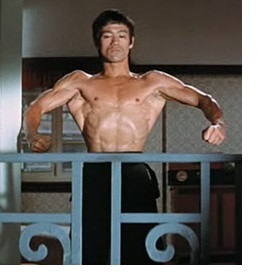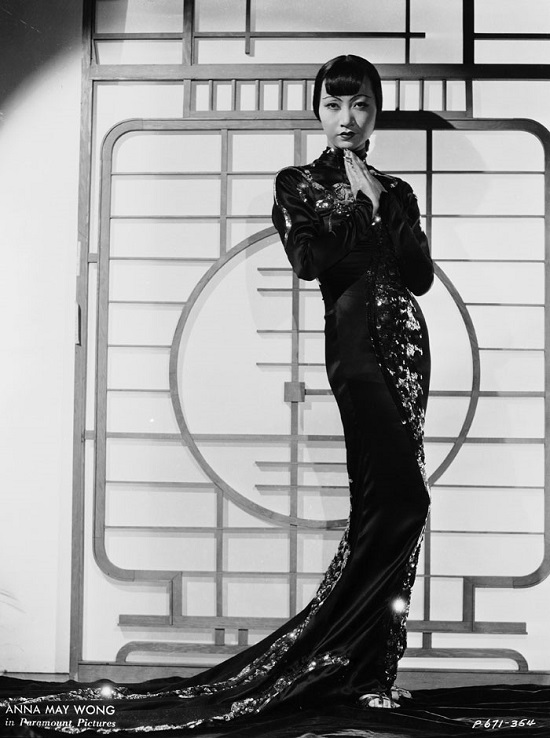Heroine/Hero: Anna May Wong & Bruce Lee
(March 14, 2015
My paean to Anna May Wong and Bruce Lee.
Though I first learned about the 1920s-era movie star Anna May Wong about a decade ago when her remarkable career was rediscovered by a new generation of film fans, I had not seen her better films until recently: Piccadilly, The Thief of Bagdad with Douglas Fairbanks (both silent) and Chu Chin Chow (talkie). (I have yet to see Shanghai Express, in which she starred with Marlene Dietrich.)
Having been an admirer of Bruce Lee since first being electrified by his martial arts films in Honolulu in the early 1970s, I was immediately struck by the parallels between Anna May and Bruce.
Wong had parts in over 50 films, Lee is remembered for a mere four, only one of which had anything close to a Hollywood production budget: Enter the Dragon was a low-budget co-production with a Hong-Kong studio that was shot with minimal pay for the cast and near-zero safety standards--the famous broken-bottle fight was staged with an actual broken bottle, and Bruce suffered cuts that required multiple stitches. Hollywood would never use an actual broken glass bottle in a live fight sequence.
Though both were of Chinese heritage, both were native-born Americans: Anna May (born 1905) was a third-generation American born in Los Angeles (her family came to California in the 1850s), and Bruce Lee (born 1940) was born in San Francisco's Chinatown.
Both faced systemic prejudice in Hollywood with extreme perseverance and adaptability. Both were denied the "natural" role-of-a-lifetime when the lead part of a Chinese character was given to a Caucasian actor. (For Anna May, the film role was in Pearl Buck's The Good Earth; for Bruce it was the lead in the TV series he created and pitched, Kung Fu.)
Blocked by discrimination in Hollywood, (Anna May was declared "too Chinese" and Bruce's accent was deemed unacceptable--uh, anyone in H'wood ever heard of a voice coach?) both only found success by leaving the U.S. for less restrictive film industries: The U.K. and Europe for Anna May, and Hong Kong (at the time, U.K.-controlled) for Bruce.
Anna May left in the late-1920s, and Bruce left in the early 1970s--forty years later, essentially nothing had changed in Hollywood.

What makes these two people heroine/hero to me is that they created roles for themselves that not only did not exist--they created roles for themselves against the active resistance of the Hollywood system, their families and in Anna May's case, the Chinese Nationalist government. Though each gained the friendships of famous Caucasian actors and actresses in the industry, they started their careers with zero support, connections, influence or money. (Wong's family operated a laundry in Los Angeles.)
It's one thing to "make it in America" by pushing past discrimination, prejudice and poverty to join the Power Elites--for example, by becoming an attorney, legislator, doctor, judge, professor, etc.--but it's another thing altogether to carve out a role that simply didn't exist, a role that would die with the creator.
Even today, there are few if any lead roles for Asian-American actors and actresses that aren't in films set in Asia or Chinatown, for example, The Joy Luck Club.
Asian-American actors are lucky to get the token-Asian parts on ensemble TV shows, and international Chinese stars such as Michelle Yeoh get to be a Bond girl in Hollywood. Actors such as Jet Li and Jackie Chan are typecast in Hollywood as either "evil-Asian villains" (unchanged from Fu Manchu stereotypes in the 20s) or comic-action heroes. Dramatic roles for Asian-American lead actors/actresses in films that aren't specifically Asian-themed don't exist.
No Asian-American actor or actress has ever been nominated for a leading-role Academy Award. (Miyoshi Umeki, a Japanese actress, won an Oscar in the 1957 for her supporting role in Sayonara; Japanese-born actor Sessue Hayakawa was nominated for Best Supporting Actor in the 1957 film The Bridge on the River Kwai, and Asian-American Pat Morita was nominated for Best Supporting Actor in 1984 for The Karate Kid (1984). Anna May's cousin, James Howe Wong, won an Oscar for cinematography.)
In other words, there were no leading-role openings for Asian-American actresses and actors in 1921 or 1971, and little has changed in 2015.
I mention this for context, so we can understand just how much talent, drive and perseverance it took for Anna May Wong and Bruce Lee to "make it" in a world that had no slot for them.
To mention but one example, Anna May learned German and French well enough to speak flawlessly in both languages, and she sang songs in Italian, Danish and a few other languages. When London critics derided her California accent, she hired a voice coach and learned to speak with a mid-Atlantic accent.
Bruce's family had moved back to Hong Kong when he was an infant, but he got in so much trouble for fighting and other hijinks that he was shipped to Seattle to finish high school and attend college. (His skills went beyond martial arts; he won dancing contests in Hong Kong as a young teen.) After teaching kung-fu (properly called wu-shu) while in college, he moved to Oakland in the mid-1960s and started a martial arts school while still in his 20s.
Called upon to defend his right to teach wu-shu to non-Chinese, Bruce fought a famous one-on-one match with a martial artist chosen to represent the rigid Status Quo of the Chinese-American community in San Francisco. Though he was dissatisfied with his endurance, Bruce won the right to teach whomever he wanted--and that soon included Hollywood movie stars (males only, to the best of my knowledge).
What's exciting to me about opportunity--in America, or anywhere else--is precisely what Anna May Wong and Bruce Lee accomplished: creating a role that did not exist before, and would not have existed without their extraordinary drive, determination, talent and perseverance in the face of rejections and disappointments that would have crushed most aspirants.

Sadly, Anna May and Bruce shared a similar fate: both died before their times, Anna May at 56 and Bruce at 33 from an allergic reaction to a pain-killer.
This essay was drawn from Musings Report 23. The weekly Musings are sent exclusively to subscribers and major contributors ($50+/year).
NOTE: Contributions/subscriptions are acknowledged in the order received. Your name and email remain confidential and will not be given to any other individual, company or agency.
|
Thank you, Judy W. ($25), for your marvelously generous contribution to this site-- I am greatly honored by your steadfast support and readership. |